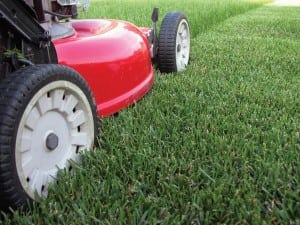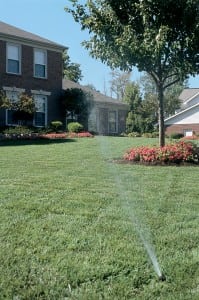Lawn Care Tips to Maintain a Greener and Healthier Yard
The professionals at East Coast Lawn share their lawn care tips. We provide organic lawn care and weed control in Maryland and Virginia. After 25 years in the business, we know a thing or two about maintaining a beautiful, healthy yard. Call now to learn more!
Lawn Mowing Tips:
The basic rule is: the hotter the weather, the higher you should mow. Higher mowing promotes deeper roots and prevents water loss by shading the soil. Taller grass also cools the soil and reduces heat stress.
 Cut your lawn when it reaches 3 inches in length.
Cut your lawn when it reaches 3 inches in length.- Cut no more than ⅓ of the grass blade length at each cutting.
- Alternate cuttings, going horizontally and vertically across the lawn.
- For a neat look, cut the lawn diagonally.
- Leave grass clippings on the lawn to decompose. As they decompose, they provide natural, organic nitrogen for the lawn, keep moisture in and help to minimize weeds.
- Always mow when the lawn is dry. This will save wear and tear on your mower. It will also keep cut grass from clumping on your lawn, and it will minimize the spread of disease.
- Check the mower blade regularly to ensure a sharp cut. Dull mower blades will hack and chop grass blades, leaving unattractive, ragged, brown edges and risking lawn damage.
- Mowing your lawn at a longer length provides a longer grass blade to absorb sunlight and perform photosynthesis, helping to create a healthier lawn.
- High mowing, as it is called, also helps to block out crabgrass and weeds.
Keep Your Mower in Good Operating Condition
- Change the oil each year.
- Change the spark plug as needed.
- Clean out any grass buildup from the underside of the mower once a month.
- Clean the air filter regularly.
- Wipe the body of your mower to remove grass, dirt, dust and any moisture after each use. It will look better and last longer.
Watering Tips
Soak those roots! You should water deeply, but not too often, since deep watering encourages deeper rooting and better health.
 During the growing season, your turf needs an average of 1 to 1½ inches of water per week from rainfall and/or sprinkling.
During the growing season, your turf needs an average of 1 to 1½ inches of water per week from rainfall and/or sprinkling.- It’s best to soak the soil to a depth of 6 inches each time, and you should try to water early in the morning to avoid evaporation.
- Give extra attention to hot or dry areas along pavement or in full sun, as well as slopes and hillsides.
- When setting up sprinklers, try to avoid letting water run down your driveway, the sidewalk or the street.
- If you’d rather not worry about watering, an automatic irrigation system may be your best bet. With an automatic system, your lawn will always get the right amounts of water at the right times of day.

